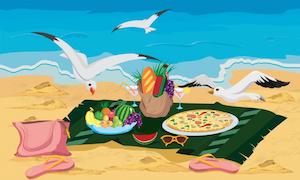4 Languages – Different Language Subtleties
 You know that you're making progress when you start to pick up language subtleties in the language you're learning. Language subtleties can be fun or embarrassing, but you'll especially remember the embarrassing ones.
You know that you're making progress when you start to pick up language subtleties in the language you're learning. Language subtleties can be fun or embarrassing, but you'll especially remember the embarrassing ones.
I'm not only talking about “false friends”, which are not that hard to check. For example, my (German speaking) father quickly learned the English word “gift”, as the same word means “poison” in German. “Gift” was also the first entry in our earlier post, 20 German False Friends To Watch Out For.
There are also quite a few such “cognates” in Spanish, as we listed in False Language Friends – Spanish: me despierto et al. (And, we just realized that we are still to list the major cognates for Italian and French, Gamesforlanguage's other two languages.)
In the meantime, here are just a few language subtleties we came across recently.
GERMAN SUBTLETIES
One of our sons told us the other day that during a stay in Germany he responded to a question whether the room temperature was ok: “Ja danke, ich bin warm.” But, the correct German expression for "I'm warm" is “Es ist mir warm.” He could not understand the chuckle of the family friend he was staying with.
The friend explained that the answer did not go together with the question: “warm sein” in German is used to mean to be “gay”, or “schwul”. Although the above exchange occurred over 15 years ago, our son still remembers the different meanings of the two expressions.
Going back even further, I remember when my French-speaking brother-in-law, who also spoke excellent German, was puzzled when he heard one of our friends tell us over a glass of beer:
“Als ich nach der Party mit dem Fahrrad nach Hause fuhr, hatte ich einen ordenlichen Affen sitzen.” (Literally: When I rode home on my bicycle after the party, I had a substantial monkey sitting.)
My brother-in-law laughed as heartily as all the others, but later he asked me: “Why did he have a monkey sitting on the bicycle with him?”
Idioms
As many other languages do as well, German has many ways to express being tipsy or drunk, for example:
• einen sitzen haben (literally: to have one sitting)
• einen Affen sitzen haben (literally: to have a monkey sitting)
• einen Schwips haben (somewhat literally: to have intoxication)
• einen im Tee haben (literally: to have one in the tea)
And in the various German dialects there are quite a few more.
Words with more than one Meaning
This brings me to German words with more than one meaning. For example, “einen Kater haben” could mean “owning a male cat”. But more likely – and you would know from the context – it would mean “having a hangover”.
In German, there are plenty of words with more than one meaning. There is no way around learning them. Examples are:
• “Linsen” are “lentils”, but also lenses of cameras
• “ein Gericht” could be “a court of justice”, or a meal
• “die Wirtschaft” could mean “the economy” or the local pub
• “ein Bienenstich” is a German cake specialty, made with yeast dough, filled with vanilla custard and topped with almonds, but it also simply means “the sting of a bee”. I still have no idea how this cake got its name.
You can sometimes guess the meaning of a word from the context, but that is often harder for idioms.
SPANISH SUBTLETIES
The other day I was again reviewing the use of “estar” and “ser” in Spanish. One of the explanations of the difference between both is the following: Think about “ser” as a “passive” verb, something “being” that way permanently, e.g. describing a personal trait; “estar”, on the other hand, is a more active verb describing a (temporary) condition.
Expressions with Ser and Estar
In the examples below the use of either “ser” or “estar” changes the meaning of the adjective. For example:
 The young woman in the picture certainly would NOT want to say: “Soy aburrido” which means “I am boring”, when she really wants to say: “Estoy aburrido” (“I am bored”) - hopefully only a temporary condition with her date!
The young woman in the picture certainly would NOT want to say: “Soy aburrido” which means “I am boring”, when she really wants to say: “Estoy aburrido” (“I am bored”) - hopefully only a temporary condition with her date!
Similarly, when you tell somebody that you are not ready, say “No estoy listo” and NOT “No soy listo”. The latter means that you are not intelligent or a quick thinker.
Also:
• vivo/a is “alive” with estar, but “clever” with ser
• cansado/a is “tired” with estar, but “tiring” with ser
Remember as well that “estar” is used to indicate your location, as in “Estoy en casa” (I'm at home), but “ser” is used to indicate your origin, e.g. place of birth, “Soy de Austria.” (I'm from Austria.)\
Exceptions
And just when I thought I had understood the differences well enough, I was reminded of a few major exceptions:
• “Está muerto” (he is dead) seems to be quite a permanent condition, but uses “estar” to indicate that somebody is dead.
• On the other hand “ser” is used to indicate time as in “Son las tres de la tarde” as in “It's 3 PM”, which seems quite transitional.
Words with more than one Meaning
As with German, Spanish also has words that have more than one meaning:
• piso: can mean “apartment” or “flat” but also is used for a building's “level” or “floor”
• gato: “cat” is the translation I know, but apparently it is also a “car jack”
• tiempo: can mean “time” or “weather”
• techo: can mean “ceiling” or “roof”
Different Meaning in Different Countries
As Spanish is spoken not only in Spain but also in the Americas, it's not surprising that there are quite a few words that have acquired various meanings in different countries. A few examples include:
• fresa: a “strawberry” in most Spanish speaking countries (but “frutilla” in Argentina); in Mexico it's also a slang term for a “spoiled, egocentric, wealthy youngster”
• coche: a “car” for Spaniards, but a slang term for “pig” in Guatemala (maybe from French “cochon”?), or a “babystroller” in Chile
• torta: a “cake” in most Spanish speaking countries, it also translates as “a punch in the mouth” in Spain.
This iTalki post has quite a few more Spanish words with different meanings in different countries. Only the context of a sentence lets you sometimes figure out the meaning. But because Spanish has phonetic spelling, it is much easier than French with its many homophones, as we'll see below.
FRENCH SUBTLETIES
As with German and Spanish above (and most languages), some French words have two or more meanings.
words with more than one meaning
For example, “voler” can mean either “to fly” or “to steal”. (Maybe the image with the seagulls below will help you remember the two meanings).
 But with nouns, often the article changes, and that can alert you to which meaning is used.
But with nouns, often the article changes, and that can alert you to which meaning is used.
• la tour (a tower), le tour (a trip)
• la poste (the post office), le poste (a position)
• la mémoire (the memory), le mémoire (the essay)
I'm doing a lot of listening at the moment (on LingQ) to get my French up a notch for an upcoming trip to French Switzerland.
words that sound the same but have a Different Meaning
One feature that makes spoken French particularly tricky are its many homophones, words that sound the same but are spelled differently. Here are a few examples:
• fin (end), faim (hunger)
• verre (glass), vers (a verse, or “towards”), ver (worm), vert (green)
• vin (wine), vain (in vain), vingt (twenty), vint (came)
• saut (jump), seau (bucket), sot (dummy), sceau (seal)
• maire (mayor), mer (sea), mère (mother)
c'est (it is), sait (knows), s'est (reflexive pronoun + est)
Not to mention the various personal verb endings that get swallowed in spoken French.
• (il) est, (tu) es
• (je) parle, (tu) parles, (ils) parlent
You have to pay special attention to the context to get the right meaning and spelling.
Idioms
Idioms pose their own challenge as the literal meaning is often quite far from the idiomatic meaning. A couple of my favorites are:
• poser un lapin à quelqu'un - to put a rabbit to someone (to stand someone up, not show up for a date)
• faire la grasse matinée - to do the fat morning (to sleep in)
• faire le pont - to make the bridge (if Thursday is a holiday, you may as well not work Friday either and take a nice long weekend)
If you like French idioms, check out our post on Other Cats to Whip? The Book of French Idioms. It's a collection of funny idioms with delightful illustrations.
Québecois
Last August, we spent several days in Montreal to attend LangFest 2017. The conference is a popular annual language gathering that attracts language enthusiasts from all over the globe.
We really enjoyed being in a French environment, but it took us a few hours to attune our ears again to the melody and expressions of Québecois, the local language spoken there.
One of the first workshops at LangFest was a quick overview of Québecois by translator and editor Grégoire Lahaia. This was really helpful for us. Lahaia pointed out three major characteristics of how Québecois is pronounced:
1) Dipthongization of long vowels (also called vowel breaking)
• père (pronounced: paèr)
• rêve (pronounced: raève)
• fort (pronounced: faort)
2) The consonants t/d are pronounced ts/ds before the vowels u/i
• tu (pronounced: tsu)
• tuer (pronounced: tsuer)
• tirer (pronounced: tsirer)
• durant (pronounced: dsurant)
3) Many words are contracted
• tu es (pronounced: t'es
• sur la (pronounced: s'a)
• il aime (pronounced: y'aime)
• je suis (pronounced: j'su)
It made us realize again how important it is to listen to different regional accents of a language to train your ear to understand variations beyond standard pronunciation.
ITALLIAN SUBTLETIES
Even if you've figured out the difference in Spanish between “estar” and “ser”, the Italian verbs “stare” and “essere” will provide you with a new challenge.
Expressions with essere and stare
In general “essere” means “to be”, and “stare” means “to stay”. But in some contexts “stare” also means “to be”. As a starter, it's useful to learn a few basic phrases, so you don't have to think about what to use with these.
Use “essere”:
For nationality, profession, possession, essential qualities.
• Sono italiano. - I'm Italian.
• Sono insegnate di francese. - I'm a French teacher.
• La casa è di Carla. - It's Carla's house.
• Il tavolo è negro. - The table is black.
For condition or emotion.
• Sono malato. - I'm sick.
• Sono felice. - I'm happy.
For Date and Time.
• Sono le dieci. - It's ten o'clock.
• È lunedì. - It's Monday.
Use “stare”:
For precise location (but in some cases, you can also use “essere”)
• La sedia sta/è in cucina. - The chair is in the kitchen.
• Lui sta da me. - He's at my place.
For certain idiomatic expressions.
• Sto bene. - I'm well.
• Come stai? - How are you?
• Sto male. - I'm feeling bad.
For the continuous tense:
• Sta piovendo. - It's raining.
• Sto mangiando una pizza. - I'm eating a pizza.
The little word “ci”
The two-letter word “ci” pops up a lot in conversational Italian. You'll see it on its own and also attached to the end of a verb. It helps to learn basic phrases, but more importantly, just become aware of it as you read or listen to Italian. With time, you'll learn to recognize the various meanings of “ci”.
Personal pronoun “ci” = us/to us/ourselves
• Marco ci ha invitato a cena. - Marco has invited us to dinner. (direct object)
• Ci l'hanno dato. - They gave it to us. (indirect oject)
• Ci siamo divertiti molto. - We enjoyed ourselves a lot. (reflexive)
• Ci vediamo là? - We'll see each other there? (reciprocal)
Demonstative pronoun “ci” = about it/on it
• Non so che farci. - I don't know what to do about it.
• Ci penserò. - I'll think about it.
• Ci puoi contare. - You can depend on it.
Adverb “ci” = here/there; there is/there are; it is/they are
• Qui non ci ritorno più. - I'm not coming back here again.
• Conosco Roma perché ci ho abitato. - I know Rome well because I lived there.
• Ci sono 30 kilometri. - It's (there are) 30 kilometers.
• C'è nessuno in casa? - Is there anybody at home?
Verbs with “ci”
A number of verbs change meaning by adding “ci”. The meanings have to be learned in context. Here are a couple of examples:
• pensare - to think
• pensarci - to think/take care of sth; ci penso io (I'll take care of it)
• stare - to be, stay
• starci - to be up for it/to fit in it; non ci sta (it doesn't fit in it)
• credere - to believe
• crederci - to believe it; non ci credo (I don't believe it)
We obviously could only touch the surface of the four languages' many subtleties. But once you start paying attention to them, you'll be a step closer to mastering the language you're learning. The proof will be when you recognize some of the expressions in conversations and can use them yourself.
